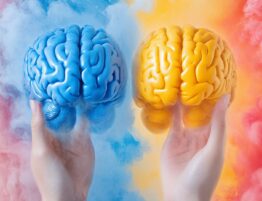Water is essential for maintaining our bodies’ health. Depending on the season, we drink different amounts of water. Also, the daily requirement for each person differs depending on weight and activity. Staying hydrated helps us maintain good overall health. We think better, move better, and have more strength and energy. Not drinking enough water can lead to dehydration, which is quite dangerous. Chronic dehydration can lead to various health problems. Dehydration makes us feel bad; we lose our memory and concentration.
In addition to these problems, dehydration has another quite severe effect. The effects of dehydration on the brain have a number of issues, so you should avoid this condition. It is very important for the brain to have enough fluids to function well. Not drinking enough water can have serious effects and lead to unusual symptoms. A person becomes inattentive, has a scattered memory, and has problems with coordination. Ongoing dehydration can result in serious health issues. It is important to take care of yourself and your body and drink enough fluids.
The Immediate Effects of Dehydration on Brain Function
Dehydration has a negative impact on the state of the body as a whole. Dehydration can be harmful to the brain and cause various negative effects. The effect of dehydration on brain function can lead to a deterioration of the condition. It is important to understand the impact of severe and mild to moderate dehydration. A person’s condition typically worsens with dehydration. Here are the symptoms that occur when mild to moderate dehydration occurs:
- Headache. When there is a lack of water in the body, dehydration occurs. In this case, the brain does not receive the necessary amount of oxygen, and the person feels pain. It can be intermittent or constant with regular dehydration.
- Constant fatigue. Not drinking enough water can make you feel unwell. It manifests itself in constant fatigue, lethargy, and unwillingness to do anything.
- Impaired concentration. Dehydration can cause poor concentration. A person may not understand what they are doing and may not remember it. It also becomes impossible to concentrate on easy tasks.
The effects of dehydration on the brain also affect neurotransmitter disorders. When you are dehydrated, dopamine and serotonin are not released in the right way. This can lead to mood swings and cognitive impairment in humans. It is essential to understand that cognitive functions are responsible for our activities. When dehydrated, we have a problem with a condition that is essential for a whole life. Here are the problems with cognitive functions during dehydration:
- Memory. Insufficient water becomes the key to getting the normal amount of oxygen to the brain. Dehydration can affect both long-term and short-term memory. A person may forget things, thoughts, and some memories from the past.
- Attention. Most often, a person becomes inattentive with constant dehydration. Long-term effects of dehydration on the brain can cause distraction. A person’s attention is disturbed during any task that requires concentration.
- Decision-making. Dehydration has an impact on a person’s decision-making process. They cannot make a decision on their own and constantly doubt the choice. This condition leads to stress, which is also a complex process.
Effects of Severe Dehydration on the Brain
Severe dehydration is a hazardous phenomenon that has a serious impact on the body. Severe dehydration isn’t just caused by not drinking enough water for a few days. Severe dehydration can occur for a variety of reasons, and the most important ones are:
- High temperature
- Excessive sweating.
- Vomiting.
- Diarrhea.
- Insufficient amount of water.
Effects of severe dehydration on the brain have a number of problems. It is important to understand what happens to a person during such dehydration. There is also an acute effect on the brain, which causes a number of unpleasant consequences. Here are the main ones:
- Confusion. During dehydration, oxygen does not enter the brain in normal quantities. A person begins to confuse data and information and cannot make decisions on their own.
- Disorientation. Severe dehydration is characterized by disorientation. A person may have trouble recognizing people and become disoriented. This condition, caused by severe dehydration, can lead to panic.
- Loss of consciousness. For severe dehydration, the worst thing can be loss of consciousness. Due to the lack of oxygen and average blood circulation, a person has heart problems. In the future, this condition can lead to loss of consciousness, which is very dangerous.
The effects of severe dehydration on the brain have negative consequences for many reasons. A person can quickly correct mild dehydration and put their body back in order. It’s crucial to address chronic dehydration promptly. This condition is a potential threat that can impair cognitive function. It also affects the brain, and a person cannot live a full life.
Long-Term Effects of Dehydration on Brain Health
Chronic dehydration can have numerous negative effects on the body. The long-term effects disrupt brain function and cause a number of heart problems. It is essential to understand the long-term effects of dehydration on the brain to avoid them. Water is necessary for our body, and a lack of it can have a negative impact.
- Structural changes in the brain. Chronic dehydration can cause serious problems for the brain. It may lead to brain shrinkage and impair areas responsible for cognitive functions. As a result, a person’s memory deteriorates, and issues arise.
- Long-term cognitive impairment. A person who does not consume enough fluids is characterized by dehydration. It provokes a decrease in cognitive functioning. As a result, memory, attention, and concentration deteriorate.
- Neurodegenerative diseases. It is essential to understand the effect of dehydration on brain function. Dehydration can lead to neurodegenerative diseases. Dehydration is characterized by an insufficient amount of air to the brain. It can lead to dementia or Alzheimer’s disease.
The Mechanisms Behind Dehydration’s Impact on Brain Function
A person feels very unwell when they do not drink enough water. Dehydration can have a long-term effect or a short-term effect. If the situation is not corrected in time, it can lead to various complications. Insufficient water has a severe impact on the body as a whole. Dehydration affects the brain through various mechanisms and interferes with its functioning. Here is what dehydration affects:
- Blood flow. When the effects of severe dehydration on the brain occur, essential functions are disrupted. Dehydration affects blood volume and reduces it significantly. Such actions lead to poor blood circulation. All the necessary nutrients do not reach the brain, thereby disrupting its function. Insufficient water increases the heart rate.
- Oxygen. Due to dehydration, the brain does not receive the necessary amount of oxygen. It contains some nutrients that are essential. When blood circulation decreases, oxygen delivery is disrupted accordingly. Dehydration also affects blood pressure and significantly lowers it. Oxygen is vital for humans, and its deficiency causes many problems.
There are long-term effects of dehydration on the brain, and they are dangerous. There are special electrolytes for normal brain function. They are essential for the proper functioning of the brain. Sodium, potassium, and calcium affect muscles and their contractions and cells. When a person does not drink enough water, these electrolytes are disturbed, and problems arise. The signals do not reach the brain properly, and cognitive impairment begins. When dehydration occurs, the brain may trigger specific physiological responses.
Strategies to Prevent Dehydration and Protect Your Brain
The effect of dehydration on brain function is very negative and causes a number of problems. It is essential to understand how to deal with it and avoid most of the issues. Sufficient water is a must for everyone. Water not only helps us quench our thirst but also has a positive effect on brain function. It is important to understand how to act to avoid dehydration; here are some tips:
- Pay attention to your weight and overall activity to consume enough fluids. In general, a person should consume about 2.5 liters of water per day. It is important to drink water regularly throughout the day. The climate is also important, and the amount of water you need will vary depending on it. In cool climates, you need less water, and vice versa; in hot climates, you need more water.
- The effects of dehydration on the brain have a negative impact on its functioning. Different groups of people have different fluid needs. Children and older adults may have different hydration requirements compared to adults. Consuming water regularly is essential to avoid dehydration.
- To maintain a good water balance, it is recommended to eat more fruits and vegetables. They not only contain vitamins and minerals but also a sufficient amount of fluid. For the brain, fruits, berries, and vegetables are extremely important for providing nutrients.
Conclusion: Prioritize Hydration for Optimal Brain Function
Effects of severe dehydration on the brain have negative consequences for the entire body. Dehydration prevents oxygen from reaching the brain and impairs cognitive function. Reduced blood circulation affects a person’s general condition. Many problems can result if you do not consume enough fluids. Some of them are very easy to fix, while more serious cases require treatment. It is important to understand how much water you should drink for good health. Depending on your weight, age, and lifestyle, the amount of fluid you need may vary. Another critical factor is the climate, which can also affect the amount of water you need. Eating fruits, berries, and vegetables is essential for the body as a whole. They also contain additional fluid with nutrients that are good for the brain.













Please, leave your review
Write a comment: